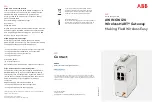
OVERFLOW
Operator
When calls ringing a operator group go unanswered, they can overflow to another destination after a pro-
grammed period of time. The operator group has its own timer. The overflow destination can be a station or
station group.
Station Group
When calls ringing a station group go unanswered, they can overflow to another destination after a pro-
grammed period of time. Each station group has its own timer. The overflow destination can be a station or
station group located in that system.
OVERRIDE CODES
This feature allows users to make emergency outside calls from a station that has a forced code such as
Account code or authorization code enabled but without requiring them to enter a forced code. The basis of
this feature is an override code table containing 8 entries of up to 11 digits each. The OfficeServ 7100 will
examine digits that are dialed from a station to see if they match any entry in the Override Code table. If the
digits match the table, the system will process the call without requiring a forced code.
PAGING
System software allows the use of five internal and two external paging zones. Stations can page any individ-
ual zone, all external zones or all external zones plus internal zone zero simultaneously. Using system pro-
gramming, each station may be allowed or denied the abilities to make and/or receive page announcements
to any zone or combination of zones. External page zones share the 2 common relays with common bell con-
trol.
PARK ORBITS
The system has 10 park orbits (0–9). These orbits can be used to park calls prior to paging and allows the call
to be retrieved by dialing a park code plus the orbit number. Calls parked in this manner can also be retrieved
by dialing the park pickup code (10) plus the station or trunk number. This feature is in addition to Call Park
and Page.
POWER over ETHERNET (PoE)
The OfficeServ 4SWM provides 4 data switch ports with PoE (
PRIME LINE SELECTION
Any station can be programmed to select a specific line, trunk group, telephone number, station or station
group when the handset is lifted or the speaker key is pressed (same as Hot Line feature).
PRIORITY CALL QUEUING
This feature places calls to an UCD or NORMAL station queue ahead of other calls based on priority level (1-
9). The system reads the DID number, Caller ID number or trunk ID number, compares it to a preprogrammed
table, then assigns it the corresponding priority that places it in the appropriate position in the group queue.
PRIVATE LINES
For private line use, stations can be prevented from dialing and/or answering any line.
4.23
Home Page
Table of Contents
















































